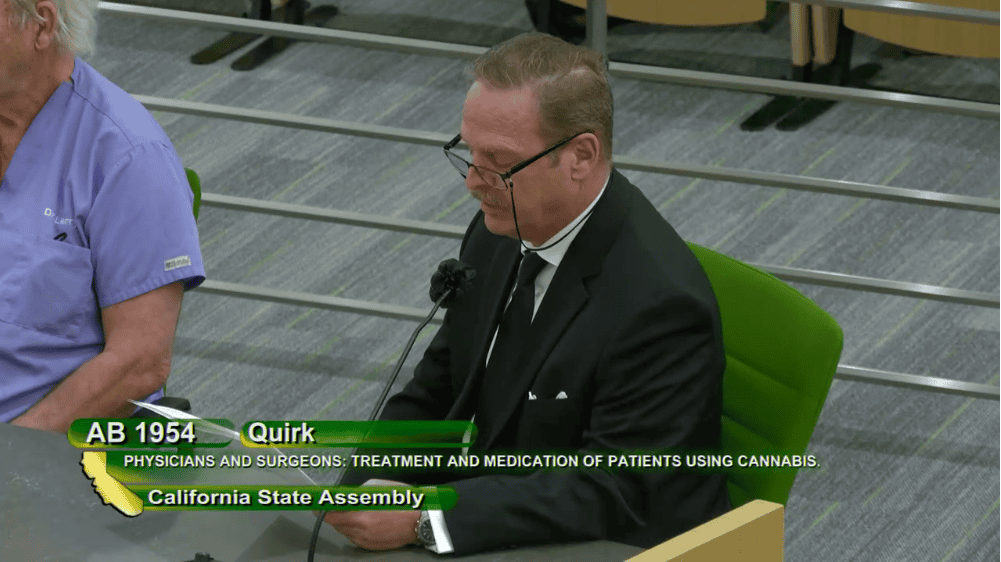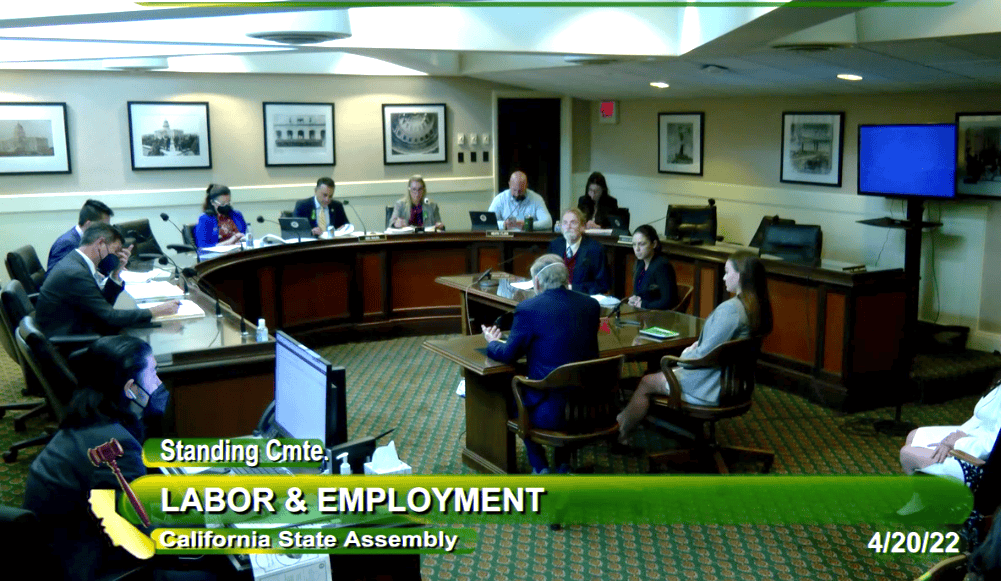It was a good 4/20 week for cannabis reform in California!
On 4/19, AB 1954 (Quirk), to prevent discrimination of pain patients and others by their doctors for using medical cannabis, passed the Assembly Business & Professions Committee by a bipartisan vote of 18-0. That bill now moves to the Appropriations committee. Watch the hearing (starts at: 1:45).
SEND A LETTER TO YOUR LAWMAKER: Allow Doctors to Treat Patients Who Use Medical Marijuana
And on 4/20, AB 2188 (Quirk), to grant employment rights to cannabis users in California, cleared the Assembly Labor & Employment committee with a vote of 5-2. Watch the hearing (starts at 1:21).
UPDATE 4/26: AB 2188 has now passed the Assembly Judiciary committee and also heads to Appropriations.
SEND A LETTER TO YOUR LAWMAKER: Support Employment Rights for Cannabis Consumers in California
JOIN US AT THE CAL NORML/ASA LOBBY DAY ON TUESDAY, MAY 10 IN SACRAMENTO WHERE WE EXPECT TO BE LOBBYING ON THESE BILLS AND MORE. 
PAIN PATIENTS RIGHTS BILL
A bill by Asm. Bill Quirk (AB 1954) seeks to protect patients who use cannabis for medicine from being summarily denied treatment and medications for chronic pain and other conditions. The bill clarifies that the use of medicinal cannabis does not constitute the use of an illicit substance for the purpose of treatment evaluation. The bill also shields physicians from punitive consequences for treatment or prescription to qualified patients.
The bill is sponsored by California NORML and Americans for Safe Access on behalf of innumerable chronic pain patients who complain that their physicians or clinics have denied them treatment with prescription opioids for no other reason than using or testing positive for medical marijuana. In fact, however, numerous studies have found that medical cannabis can actually reduce dependence on opiates and other prescription drugs in chronic pain patients.
Medical cannabis patient/advocate Richard Miller, who suffers severe chronic pain from spinal injuries, testified for the bill (pictured). “AB 1954 is critically important for patients like me who need access to opioid therapy. Cannabis patients are being discriminated against and are often unable to treat their intractable pain,” said Miller. “This has become a public safety issue, as patients are resorting to purchasing opioids on the street, putting them at risk at a time when fentanyl overdoses are on the rise. Health care plans shouldn’t be putting doctors in the position of violating their oath to ‘do no harm.’”
Also testifying was Dr. Larry Bedard, who sponsored a 2019 resolution approved by the California Medical Association House of Delegates and Board of Trustees stating, “That CMA oppose policies of health plans, health systems, and hospitals that have pain management programs that automatically eliminate patients who use therapeutic cannabis.”
In support of AB 1954, Dr. Bedard states, “The National Academy of Science, Engineering and Medicine after reviewing 15,999 studies found ‘conclusive’ scientific evidence that cannabis is effective in treating chronic pain. More than 30 studies have demonstrated that patients with chronic pain decrease or eliminate their use and need for opioids like OxyContin.” State-sponsored studies at the California Center for Medical Cannabis Research at UC San Diego have also found cannabis to be a useful therapy, particularly for neuropathic pain.
In its 2016 guidelines for prescribing opiates for chronic pain, the Centers for Disease Control recommended that patients not be dismissed from care based on a urine test for THC because this could have adverse consequences for patient safety. Nonetheless, many health plans, health systems, and hospitals in California require patients to sign agreements not to use illicit or controlled substances for the duration of their prescribed opioid treatment and agree to drug testing.
An online survey by Cal NORML of nearly 600 patients found that 18.5% of respondents have been denied prescription medications due to their use of cannabis. Many physicians are under the mistaken impression that they cannot prescribe opioid medications to patients who test positive for cannabis, resulting in hundreds of chronic pain patients who are unfairly denied access to quality-of-life or life-saving medications.
“At least eight other states have laws protecting medical marijuana patients against discrimination by their doctors,” said Ellen Komp, Cal NORML deputy director. “It’s time Californians had the same protection.”

EMPLOYMENT RIGHTS FOR CANNABIS CONSUMERS
AB 2188 (Quirk) would end job discrimination based on cannabis metabolites testing.
Testing or threatening to test bodily fluids for cannabis metabolites is the most common way that employers harass and discriminate against employees who lawfully use cannabis in the privacy of their own homes. Cannabis metabolites are the non-psychoactive substances that can be detected in a person’s urine or hair for up to several weeks after they have consumed cannabis. Testing positive for cannabis metabolites has no scientific value in establishing that a person is impaired or “high.”
AB 2188 is consistent with a 2021 California State Personnel Board (SPB) ruling that the California Department of Transportation must reinstate an employee who failed a urine test for marijuana use, because such a test does not establish that an employee is under the influence of marijuana when reporting for duty.
Assembly Member Quirk’s bill does not prevent employers from ensuring that employees are not impaired on the job. It allows for other forms of testing, such as performance-based impairment testing or testing for THC—the active ingredient in marijuana—in blood or oral fluids. THC is present when users are actually impaired and can establish that a person has consumed cannabis in the past several hours. Oral fluid tests for THC are less invasive, less costly, and less susceptible to cheating than urine tests, and have been federally approved for workplace use by SAMHSA (Substance Abuse and Mental Health Services).
AB 2188 does not prohibit taking action against employees or prospective employees who test positive for THC or who fail a performance-based impairment test. It excludes employees in the construction trades, and has exemptions for employers who are required to follow federal drug-testing mandates.
Studies have shown that off-the-job cannabis use is not positively associated with elevated rates of occupational accidents or injuries, and that liberalized marijuana laws are associated greater labor participation, lower rates of absenteeism, declines in workers’ compensation filings, and higher wages.
“Urine testing is an odious invasion of workers’ privacy,” says California NORML Director Dale Gieringer. “Urine tests are too frequently misused to discriminate against unpopular workers and minorities. Studies have found that Blacks are more likely than Whites to be disciplined for failing drug tests.
“California has always been a leader in the cannabis industry, and we must lead once again by prohibiting discrimination against people who consume cannabis when they are off-the-job,” said Amber Baur, executive director, United Food and Commercial Workers Western States Council. “Using an outdated test to determine workplace impairment does not increase workplace safety—it only causes employees to feel unsafe and harassed at work. We’re proud to support AB 2188 because it’s time for the law to keep up with science.”
“Our members and the people we care for live in communities most likely to be discriminated against for the legal consumption of cannabis. This practice must end,” said Doug Moore, Executive Director, UDW/AFSCME 3930.
Cal NORML director Dale Gieringer testified for the AB 2188, noting, “In effect, urine testing is like looking through an employees trash cans for liquor bottles to see what they’re doing off the job.” Pointing out that 20 other states have protections for medical and/or recreational cannabis users, Gieringer said it’s time California also protected its workers.
Jassy Grewal of the United Food and Commercial Workers also testified, saying, “An outdated and racially motivated metabolites test which is ineffective at detecting impairment is keeping many patients and workers are prohibited from using legal cannabis off the job.”
Other supporters include the CA Board of Registered Nursing, California Cannabis Industry Association, California Employment Lawyers Association, Cannabis Equity Policy Council, Drug Policy Alliance, Last Prisoner Project, Los Angeles Housing Compliance, Origins Council, and United Cannabis Business Association.
Speaking In opposition to the bill was Robert Moutrie of the Cal Chamber of Commerce who said, “We’re not opposed to oral swab testing [allowed under the bill] nor off-the-job [marijuana] use.” They are offering amendments, as is the state Building and Construction Trades.
Committee member Asm. Alex Lee summed it up well when he said, “On this day, when so many are celebrating 4/20, they should not be fearful of losing their job, especially for something that can linger in their system and not be related to impairment.”
Committee chair Asm. Ash Kalra closed the hearing by saying, “We have to destigmatize cannabis use, which started with prejudice. Ultimately, it’s about bringing equity in a space that allows workers to be free and not under the microscope for something they do in their own free time.” He ended by wishing Asm. Quirk a Happy 4/20.
SEND A LETTER TO YOUR LAWMAKER: Support Employment Rights for Cannabis Consumers in California
Please support Cal NORML’s efforts to in 2022! Click Here to Donate or here to join or renew your individual membership, or take advantage of our April business membership and banner ads specials below. You can also Sponsor Our Upcoming Lobby Day.
CAL NORML 50TH ANNIVERSARY SPECIALS (through 5/31).
Business Membership Special:
Join Cal NORML and grow your business
$450 for one-year business membership ($50 off)
Includes a listing on CaNORML.org and other multi-platform promotional benefits.
Banner Ad Special:
Increase your support and expand your presence on CaNORML.org
$50 off first two months of your banner ad on CaNORML.org — $100 savings
Reserve your targeted space by contacting [email protected] or 707-337-9747



